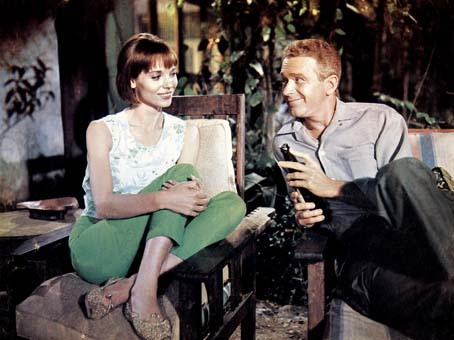 Charlton Heston, as main player, gave the character the divine breath and made him human again. The sceneries and wardrobe were carefully conceived. Dialogs sequences were artfully built. By the world Rodrigo is recognized as having been great. Many are the legends that keep his memory alive. But for Spain and Portugal, this film portrays a budding time for two countries that share the same blood and are siblings.
Charlton Heston, as main player, gave the character the divine breath and made him human again. The sceneries and wardrobe were carefully conceived. Dialogs sequences were artfully built. By the world Rodrigo is recognized as having been great. Many are the legends that keep his memory alive. But for Spain and Portugal, this film portrays a budding time for two countries that share the same blood and are siblings.

The story is set in the Twelve Century. The Iberian Peninsula was then divided by two cultures and religions, in Christian kingdoms and Moorish kingdoms. King Ferdinand of Castile Leon and Asturias is at war with the Moors and sends one of his bravest knights into battle – Rodrigo Diaz de Bivar. In his wedding day, Rodrigo on his way to his bride Ximene, fights the Moors but his heart is full of love and he decides to spear the prisoners. One of them, an Arab king, becomes deeply touched and blesses Rodrigo with this words “Among our people we have a name for a man with the vision to be just and the courage to be merciful. We call such a man El Cid. I Moutamin, Emir of Saragossa, swear loyal legion to King Ferdinand and to the Cid of Bivar”. But other knights, their hearts full of envy, find in this a splendid opportunity to harm Rodrigo and accuse him of treason. His father, Don Diego, defends him and, consequently, is humiliated by Ximene’s own father. Rodrigo must protect Don Diego’s honour but still tries to reason with the offender. There is a duel to the death and Rodrigo wins. Now, Ximene (one of Sophia Loren’s finest roles) is torn by the passion that links her to Rodrigo and the desire to avenge her father. So begins this story, so begins the path for El Cid’s glory, for this movie is more than the dwelling of a man and a woman. It is an example of the courage that rises above small things, of tolerance, respect and self sacrifice that come from great people.

The characters in the film bear a striking resemblance to the real ones which contributes to hold the viewer attention.
As a mean to share my national pride, I must add a small historic note. Not long after El Cid’s time, King Ferdinand’s son Alphonsus would present his illegitimate daughter Teresa with a county – Condado Portucalense. At the age of sixteen, Afonso Henriques her son, would claim the right to also be king on the ground of being grandson of another king and refused to be taxed. Portugal was born. The Hispanic kingdoms would slowly be united into forming Spain as a whole. Spain and Portugal were separated by history but both lands are warmed by El Cid’s deep red blood.
When beauty joins greatness the result is perfection in motion. Miklos Rozsa’s soundtrack and Anthony Mann’s direction… May the viewer decide which is which.
One of he most sublime work of art in Cinema, El Cid will change you as he has changed history.
Cast and crew and scene from the movie:
Directed by Anthony Mann
Produced by Samuel Bronston
Music by Miklos Rozsa
Charlton Heston (as El Cid), Sophia Loren (as Ximene), Genevieve Page (as Urraca), Ray Valone, John Fraser, Gary Raymond, Hurd Hatfield, Massino Serato, Hubert Lom and Douglas Wilmer (as Moutamin)...






